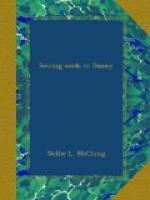Sam stood leaning on a pitchfork in front of the barn door. He was a stout man of about fifty years of age, with an ox-like face. His countenance showed the sullen stolidity of a man who spoke little but listened always, of a man who indulged in suspicious thoughts. He knew everything about his neighbours, good and bad. He might forget the good, but never the evil. The tragedies, the sins, the misdeeds of thirty years ago were as fresh in his memory as the scandal of yesterday. No man had ever been tempted beyond his strength but Sam Motherwell knew the manner of his undoing. He extended no mercy to the fallen; he suggested no excuse for the erring.
The collector made known his errand. Sam became animated at once.
“What?” he cried angrily, “ain’t that blamed thing paying yet? I’ve a good notion to pull my money out of it and be done with it. What do you take me for anyway?”
The collector ventured to call his attention to his prosperous surroundings, and evident wealth.
“That’s like you town fellows,” he said indignantly. “You never think of the hired help and twine bills, and what it costs to run a place like this. I pay every time I go, anyway. There ain’t a time that I let the plate go by me, when I’m there. By gosh! you seem to think I’ve money to burn.”
The collector departed empty-handed.
The next time Sam went to Millford he was considerably surprised to have the young minister, the Reverend Hugh Grantley, stop him on the street and hand him twenty-five dollars.
“I understand, sir, that you wish to withdraw the money that you invested in the Lord’s work,” he said as he handed the money to Sam, whose fingers mechanically closed over the bills as he stared at the young man.
The Rev. Hugh Grantley was a typical Scotchman, tall and broad shouldered, with an eye like cold steel. Not many people had contradicted the Rev. Hugh Grantley, at least to his face. His voice could be as sweet as the ripple of a mountain stream, or vibrate with the thunder of the surf that beats upon his own granite cliffs.
“The Lord sends you seed-time and harvest,” he said, fixing his level gray eye on the other man, who somehow avoided his gaze, “has given you health of body and mind, sends you rain from heaven, makes his sun to shine upon you, increases your riches from year to year. You have given Him twenty-five dollars in return and you regret it. Is that so?”
“I don’t know that I just said that,” the other man stammered. “I don’t see no need of these fine churches and paid preachers. It isn’t them as goes to church most that is the best.”
“Oh, I see,” the young man said, “you would prefer to give your money for the relief of the poor, for hospitals or children’s homes, or something like that. Is that so?”
“I don’t know as there’s any reason for me givin’ up the money I work hard for.” Sam was touched on a vital spot.




